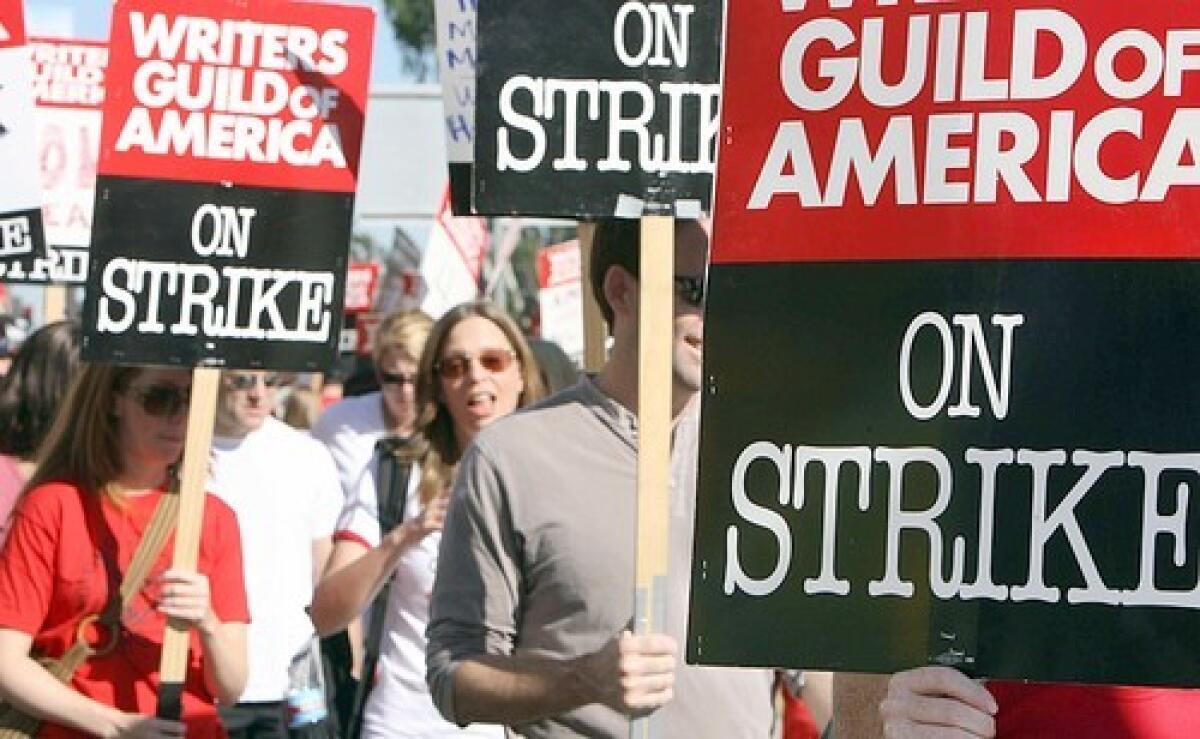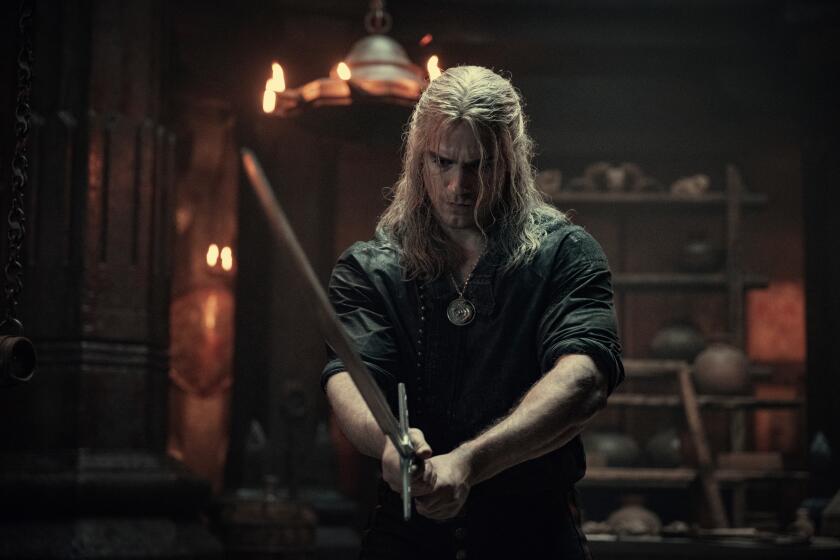SCRIPTLAND: Writers finding solace, stories on picket lines

As the Writers Guild tries to fortify itself against the inevitable slow bleed of numbers and commitment among its membership in its fifth week of striking, many gung-ho writers continue to find novel ways of surviving the monotony and social awkwardness of the picket lines.
Notwithstanding the occasional field trip to a location shoot to disrupt filming, most writers have been stuck walking in tight loops in four-hour picketing shifts that can ultimately amount to a daily 10-mile hike. Though the guild leadership has decreased the weekly picketing requirement, the weariness is taking its toll.
FOR THE RECORD:
Scriptland: The Scriptland column in Wednesday’s Calendar section identified the Writers Guild strike captain at Paramount’s Bronson gate as Mike Eddy. His name is Matt Eddy. The article also said that a YouTube video featuring screenwriter Irving Brecher was directed by Nell Scovell. Scovell co-wrote and produced the video; it was directed by Rodman Flender. —
“These picket lines are much more somber,” observes Daniel Vaillancourt (MTV’s “Undressed”), who compared it to the rowdier lines of last year’s unsuccessful “America’s Next Top Model” strike. “It’s almost like being at a funeral.”
“I would recommend buying stock in Dr. Scholl’s,” cracked Josh Olson (“A History of Violence”), who was literally soaking his feet after a picketing shift when I spoke with him.
On the plus side, one Oscar-winning writer was pleasantly surprised to note that his good cholesterol count has gone up in the weeks that he’s picketed.
Numerous feature writers have commented on the TV-film divide out on the lines (not to mention the various showrunner and fringe cable TV cliques). Given the way they are staffed and their collaborative working environment, the TV crews all seem to know each other, breeding an environment that one feature writer describes as “like a big university.”
“[TV writers] are truly a different creature,” says Alec Sokolow (“Toy Story”), who prefers picketing at Sony because its older crowd tends to be less TV-centric. “They love a certain social herd-like interaction. Most feature writers don’t get that opportunity, so you get together and very carefully begin a conversation with somebody, and then decide if somehow it’s gonna lead you to more Xan- ax.”
“I’m sure a lot of other feature writers have trouble rallying together as a group -- for me it feels like church,” says Lorene Scafaria (“Nick and Norah’s Infinite Playlist”), who has picketed on both coasts and prefers the Bronson gate at Paramount for strike captain Mike Eddy’s choreographed mayhem. “It’s just a little too churchy for me to chant things. But I would say that got washed away after the first time. There was something unifying about it.”
On the other hand, younger writers unexpectedly brushing shoulders with more experienced brothers and sisters in both media have been using the opportunity to network and seek career advice. Some film-TV cross-pollinating has occurred as new acquaintances go out to post-picketing lunches -- nothing brings people together quite like the coffee and grease at Bob’s Big Boy.
The forced socializing has also been a boon for those looking for fresh romantic entanglements (and, thus, juicy raw material for future black comedies). Like a giant sociology experiment, the vast network of picketing writers has predictably spawned singles lines and gay-centric lines.
One straight male writer puzzled over why all the guys at the NBC Alameda gate were so good-looking. It turns out that he was picketing with the membership of the guild’s Gay & Lesbian Writers Committee, coincidentally stationed outside “The Ellen DeGeneres Show” soundstages.
Workshop entails labor amid luxury
The Hollywood screenwriting life rarely involves lounging around a 17th century chateau and ruminating on thematic subtext while French New Wave icon Jeanne Moreau fetches you a snifter of brandy (though I hear development meetings at Gary Sanchez Productions come close). But then, Europeans do a lot of things better. Like eat, argue and juggle affairs.
On Monday, nine fortunate writers plopped their laptops and coffee mugs down at éQuinoxe, a twice-yearly screenwriting workshop that takes place in Evian, France. Drawn from thousands of submissions from all over the world, these promising filmmakers open up their screenplays to the input of advisors such as Alvin Sargent (“Ordinary People”), Danièle Thompson (“Cousin, Cousine”) and Martin Sherman (“Mrs. Henderson Presents”), and producers and directors such as Sydney Pollack, Stephen Frears, Laura Ziskin and Frédéric Fonteyne.
“As screenwriters, we lead very lonely lives in our own rooms not speaking with other people or getting a lot of input,” says Janet Peoples (the beneficiary of Mlle. Moreau’s cocktail kindness), who has twice attended as an advisor with her co-writer husband, David (“12 Monkeys”). “It gives us a chance to be out in the world with other screenwriters, especially screenwriters and directors from Europe. It gives us a freshness.”
Program president Noëlle Deschamps worked at the Sundance Institute for several years in the early 1990s and asked founder Robert Redford if she could spin a European version off from their hallowed screenwriting workshop. Unlike Sundance, which is meant to support films that are an alternative to mainstream cinema, éQuinoxe takes on all types of work to turn out “commercial authorial” movies, or “the content of auteur films with an openness to an international audience.”
Ninety or so of the participating screenplays have gone on to be produced over the years, and each night an advisor or attendee filmmaker screens one of his or her films. This year the weeklong workshop will end with a special three-day mini-festival highlighting human rights-related films at the Palais Lumière, courtesy of éQuinoxe’s new sponsor, the United Nations.
Now in its 30th edition, éQuinoxe no longer takes place at the famed Château Beychevelle in Bordeaux. When the chateau was sold, the organizers had to settle for the near-slum conditions of the Royal Resort in Evian, where somehow les scénaristes have been able to maintain their creative focus amid the squalor.
“The meals that were wonderful and the wine that was wonderful were definitely a part of the day, but it was not a goof-off,” claims David Peoples. “I’m serious, they do work us hard!”
Videos focus on funny side of strike
Everyone’s got his or her favorite strike-generated video, but I feel compelled to point out two recent entries.
Just to prove you’re never too old to recognize the Internet as the future of entertainment, 93-year-old Oscar-nominated screenwriter Irving Brecher (“At the Circus,” “Meet Me in St. Louis,” “The Life of Riley”) posted a wry YouTube declamation called “Same Old Story” directed by “NCIS” writer-producer Nell Scovell (www.youtube.com/watch?v=B1NeihzlBHo). Seated in his study, Brecher calmly notes that he’s been waiting for a “fair deal” since 1938.
“It’s not as if we were asking for the whole cash cow,” Brecher says in the video with a touch of exasperation. “All we would like is a little squirt of milk.”
And TV writer-producer Bob Kushell recruited “Samantha Who?” star Christina Applegate to play his kerchiefed wife in a funny video called “The Strike, Your Marriage and You” (www.youtube.com/watch?v=EtcF1_BBq5Q). Its simple premise has Kushell explaining in faux-sexist terms the effects of his disruptive presence at home now that he’s not working 15 hours a day, with the hook being that his dis- gruntled actual wife, Karen, has refused to participate in the video.
Scriptland is a weekly feature on the work and professional lives of screenwriters. Please e-mail any tips or comments to fernandez_jay@hotmail.com.
The complete guide to home viewing
Get Screen Gab for everything about the TV shows and streaming movies everyone’s talking about.
You may occasionally receive promotional content from the Los Angeles Times.



